Posted on October 19, 2006 by The Orwell Prize -
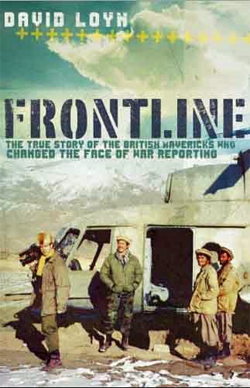
Rory Peck, Peter Jouvenal, Vaughan Smith, and Nicholas Della Casa were the founder members of an exclusive and dangerous club: the Frontline TV News Agency. Between them, this colourful collection of adventurers and ex-army officers captured some of the key images at the end of the Cold War, and the fractured, fissile world which emerged. Two of them are now dead: killed in action. The way they lived and died was an anachronism; they were eccentrics who might have been happier fighting wars in the British Empire a century before. Instead, they brought back pictures from the worst war zones the late twentieth century had to offer. And it suited them. For the men of Frontline, how things were done was as important as what was done. All four of the founders, and those they recruited, shared the same panache, wit, and disdain for authority, planning the next trip to the Hindu Kush in the bar of the Ritz. Their story reads like a latter-day Rudyard Kipling adventure. But while their lives may have been lived as if they were still playing the Great Game, they also cared passionately about their work and the truth it conveyed. Part Bang Bang Club, part Flashman, Frontline is the gripping story of lives lived to the full in some of the worst places on earth.
Posted on October 19, 2006 by The Orwell Prize -

Jonathan Freedland has been a columnist for The Guardian since 1997. He also writes a monthly column for the Jewish Chronicle, as well as presenting BBC Radio 4’s contemporary history series, The Long View. He served for four years as The Guardian’s Washington correspondent and has written for a variety of US publications, including the New York Times, Los Angeles Times and Newsweek. US affairs remain a keen interest, along with British politics and the Middle East. He has written two books, Jacob’s Gift (2005) and Bring Home the Revolution: the Case for a British Republic (1998).
Posted on October 19, 2006 by The Orwell Prize -
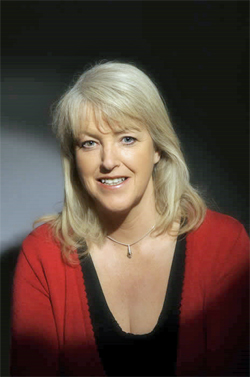
Lesley Riddoch is one of Scotland’s best known commentators and broadcasters. She has held many influential positions including assistant editor of The Scotsman and contributing editor of the Sunday Herald. She is perhaps best known for her broadcasting with programmes on Radio 4, BBC Radio 2 and BBC Radio Scotland, for which she has won two Sony speech broadcaster awards. Lesley runs her own independent radio and podcast company, Feisty Ltd, which has produced several series including a weekly topical phone-in programme for BBC Radio Scotland. She is a weekly columnist for The Scotsman and the Sunday Post and a regular contributor to The Guardian’s Comment is Free.
Posted on October 19, 2006 by The Orwell Prize -

When Julia flies in to war-scarred Sierra Leone from London, she is apprehensive about seeing her uncle Moses for the first time in twenty years. But nothing could have prepared her for her encounter with her eight-year-old cousin, Citizen, a former child soldier, and for the shocking truth of what he has done. Driven by a desire to understand Citizen, Julia takes the disturbed child into the ‘bush’. There they meet other child soldiers, and a storyteller, Bemba G., who provides a safe haven for them all and strives to return them to childhood through play, love, story-telling and performance. As Julia gradually rediscovers Africa, the different generations of her family rediscover their bonds. And then Bemba G. directs the child soldiers in a version of Shakespeare’s Julius Caesar, with powerful effect.
The judges said:
Anyone who has spent time in Africa can immediately recognise the power and truth of her descriptions. It is a work of great intimacy and moral complexity, the kind of writing that sheds light on a world we barely understand…the book is one that Orwell himself might have liked.
Posted on October 19, 2006 by The Orwell Prize -
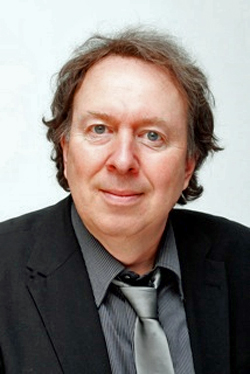
Established as one of the most influential political commentators in the country, Steve Richards became The Independent’s chief political commentator in 2000 having been political editor of the New Statesman. He previously presented GMTV’s flagship current affairs show The Sunday Programme and presents BBC Radio 4’s Week in Westminster.
Posted on October 19, 2005 by The Orwell Prize -
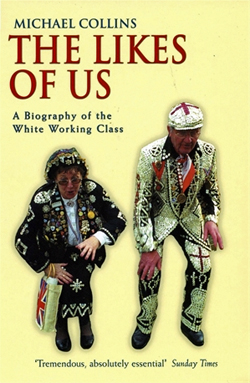
Once they were portrayed as the salt of the earth. Nowadays, they take to the streets when paedophiles and asylum seekers are in their midst; they expose their lives in TV documentaries; they love Gucci and hate the Euro – the broadsheets cast them as xenophobes and exhibitionists and mock their tastes and attitudes. Who are the white working class and what have they done to deserve this portrayal? The Likes of Us is a fascinating and wholly original examination of London’s white working class.
Posted on October 19, 2005 by The Orwell Prize -

Juliet Gardiner’s critically acclaimed book – the first in a generation to tell the people’s story of the Second World War – offers a compelling and comprehensive account of the pervasiveness of war on the Home Front. The book has been commended for its inclusion of many under-described aspects of the Home Front, and alongside familiar stories of food shortages, evacuation and the arrival of the GIs, are stories of Conscientious Objectors, persecuted Italians living in Britain and Lumber Jills working in the New Forest. Drawing on a multitude of sources, many previously unpublished, she tells the story of those six gruelling years in voices from the Orkney Islands to Cornwall, from the Houses of Parliament to the Nottinghamshire mines.
Posted on October 19, 2005 by The Orwell Prize -

Matthew Parris is a former MP and a prize winning author, columnist and broadcaster. He currently writes columns for The Times and the Spectator as well as presenting the BBC Radio 4 biographical programme Great Lives. He was named Political Journalist of the Year at the Press Awards 2015.
Posted on October 19, 2005 by The Orwell Prize -

Acute, questioning, humane and passionately concerned for justice, Helena Kennedy is one of the most powerful voices in legal circles in Britain today. Here she roundly challenges the record of modern governments over the fundamental values of equality, fairness and respect for human dignity. She argues that in the last twenty years we have seen a steady erosion of civil liberties, culminating today in extraordinary legislation, which undermines long established freedoms. Are these moves a crude political response to demands for law and order? Or is the relationship between citizens and the state being covertly reframed and redefined?
- Helena Kennedy, David Halpern, Cristina Odone and Meg Russell, ‘Has the political class been fatally weakened?’, Orwell Prize Shortlist Debate 2010
- Helena Kennedy’s website
Posted on October 19, 2005 by The Orwell Prize -

A journalistic memoir from one of the most recognisable TV news correspondents in the UK. How do you decide what is a ‘story’ and what isn’t? What does a newspaper editor actually do all day? How do hacks get their scoops? How do the TV stations choose their news bulletins? How do you persuade people to say those awful, embarassing things? Who earns what? How do journalists manage to look in the mirror after the way they sometimes behave? The purpose of this insider’s account is to provide an answer to all these questions and more. Andrew Marr’s brilliant, and brilliantly funny, book is a guide to those of us who read newspapers, or who listen to and watch news bulletins but want to know more. Andrew Marr tells the story of modern journalism through his own experience. This is an extremely readable and utterly unique modern social history of British journalism, with all its odd glamour, smashed hopes and future possibility.
Posted on October 19, 2005 by The Orwell Prize -
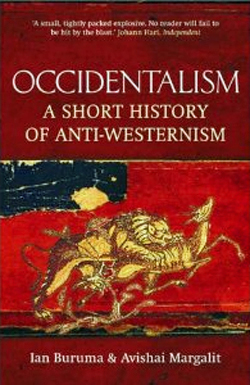
A profound investigation of the history of anti-Westersn stereotypes that traces them back to the West itself. Twenty -five years ago, Edward Said’s Orientalism described the denigrating mirage of ‘the East’ in the Western colonial mind. But as Ian Buruma and Avishai Margalit show in this book, ‘the West’ is the more dangerous mirage of our time, and the idea of us in the minds of our self proclaimed enemies is still largely unexamined and misunderstood. Occidentalism is their groundbreaking investigation of the demonizing fantasies and stereotypes about the Western world that fuel such hatred in others. ‘Radical Islam’ is generally perceived as a purely Islamic phenomenon, but Buruma nad Argalit show that this radicalism owes primary debt to the West. Movement like al-Qaeda are stalked by the same Western bogeymen that have haunted the thoughts of revolutionary groups going back to the early nineteenth century. The same elements of the anti-Western worldview appear again and again: the rootless cosmopolitan living in the Western city; the sterile Western mind, all reason and no soul; the machine society, controlled from the centre by a cabal of insiders – often Jews – pulling the hidden levers of power. The anti-Western virus has found a ready host in the Islamic world for a number of legitimate reasons, but in no way is it exclusively Islamic matter. A world of extraordinary range and erudition, Occidentalism will permanently enlarge our understanding of the world in which we live.
Posted on October 19, 2004 by The Orwell Prize -

Still in her teenage years, Nazneen finds herself in an arranged marriage with a disappointed man who is twenty years older. Away from the mud and heat of her Bangladeshi village, home is now a cramped flat in a high-rise block in London’s East End. Nazneen knows not a word of English, and is forced to depend on her husband. But unlike him she is practical and wise, and befriends a fellow Asian girl Razia, who helps her understand the strange ways of her adopted new British home. Nazneen keeps in touch with her sister Hasina back in the village. But the rebellious Hasina has kicked against cultural tradition and run off in a ‘love marriage’ with the man of her dreams. When he suddenly turns violent, she is forced into the degrading job of garment girl in a cloth factory. Confined in her flat by tradition and family duty, Nazneen also sews furiously for a living, shut away with her buttons and linings – until the radical Karim steps unexpectedly into her life. On a background of racial conflict and tension, they embark on a love affair that forces Nazneen finally to take control of her fate. Strikingly imagined, gracious and funny, this novel is at once epic and intimate. Exploring the role of Fate in our lives – those who accept it; those who defy it – it traces the extraordinary transformation of an Asian girl, from cautious and shy to bold and dignified woman.
Posted on October 19, 2004 by The Orwell Prize -

I became a journalist almost by accident. Having learned Russian and been hired after university by Reuters (to my own surprise and the slight dismay of traditionally-minded editors who weren’t sure a Guardian-reading blonde female would be tough enough for the job), I was then catapulted into the adrenaline-charged realm of conflict reporting. While on a trainee assignment in Paris, I fell in with the Cambodian émigré community and ended up reporting in Cambodia myself, a decade after the Khmer Rouge regime ended, as well as covering Cambodian peace talks in places as far apart as Indonesia and Paris. That led to a conflict reporting job in Africa, commuting between Angola and Mozambique and writing about death, destruction, diamonds and disease, and later to a posting in a country that stopped being the Soviet Union three months after I arrived. I spent much of the early 1990s in smoky taxis in the Caucasus mountains, covering a series of small post-Soviet conflicts that built up to the war in Chechnya. As a journalist I’ve written for, among others, The Times and its website, the Los Angeles Times, Prospect, the Times Literary Supplement, The Guardian Saturday magazine, the Daily Mail, the Evening Standard, Eve magazine, The Observer Food Monthly and The Erotic Review. I’ve written six books: four historical novels and two non-fiction books about my experiences as a journalist.
Other links
Posted on October 19, 2004 by The Orwell Prize -
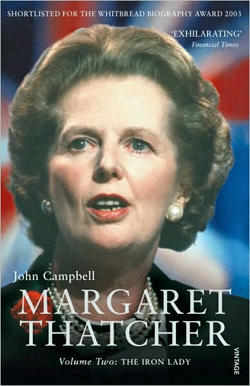
The first volume of John Campbell’s biography of Margaret Thatcher was described by Frank Johnson in the Daily Telegraph as ‘much the best book yet written about Lady Thatcher’. That volume, The Grocer’s Daughter, described Mrs Thatcher’s childhood and early career up until the 1979 General Election which carried her into Downing Street. This second volume covers the whole eleven and a half years of her momentous premiership. Thirteen years after her removal from power, this is the first comprehensive and fully researched study of the Thatcher Government from its hesitant beginning to its dramatic end. Campbell draws on the mass of memoirs and diaries of Mrs Thatcher’s colleagues, aides, advisers and rivals, as well as on original material from the Ronald Reagan archive, shedding fascinating new light on the Reagan-Thatcher ‘special relationship’, and on dozens of interviews. The Iron Lady will confirm John Campbell’s Margaret Thatcher as one of the greatest political biographies of recent times.
Posted on October 19, 2004 by The Orwell Prize -
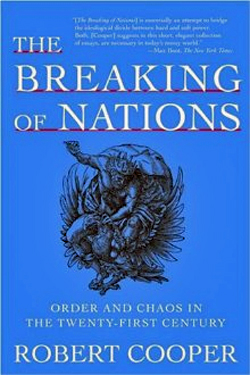
When communism collapsed in 1989 there was a fundamental change in the European state system. This landmark book presents a radical interpretation of the new international order. Many of what Cooper calls ‘post-modern’ states, including the EU and Japan, operate on the basis of openness, law and mutual security. The United States, Cooper shows, has yet to decide whether to embrace the ‘post-modern’ world of independence, or to pursue unilateralism and power politics. The key question is how these states should deal with a world in which terrorists ignore borders and the familiar certainties of the Cold War alliances no longer exist. He argues theat Europeans have to be prepared to use the rougher methods of an earlier era – force, pre-emptive attack, deception – if they are serious about safeguarding the stability they have achieved.
The Breaking of Nations is required reading for those seeking to understand the uncertain times in which we live.
Posted on October 19, 2004 by The Orwell Prize -

The story of the Warsaw Rising from the the leading British authority on the history of Poland. Rising ’44 is a brilliant narrative account of one of the most dramatic episodes in 20th century history, drawing on Davies’ unique understanding of the issues and characters involved. In August 1944 Warsaw offered the Wehrmacht the last line of defence against the Red Army’s march from Moscow to Berlin. When the Red Army reached the river Vistula, the people of Warsaw believed that liberation had come. The Resistance took to the streets in celebration, but the Soviets remained where they were, allowing the Wehrmacht time to regroup and Hitler to order that the city of Warsaw be razed to the ground. For 63 days the Resistance fought on in the cellars and the sewers. Defenceless citizens were slaughtered in their tens of thousands. One by one the City’s monuments were reduced to rubble, watched by Soviet troops on the other bank of the river. The Allies expressed regret but decided that there was nothing to be done, Poland would not be allowed to be governed by Poles. The sacrifice was in vain and the Soviet tanks rolled in to the flattened city. It is a hugely dramatic story, vividly and authoritatively told by one of our greatest historians.
Posted on October 19, 2004 by The Orwell Prize -
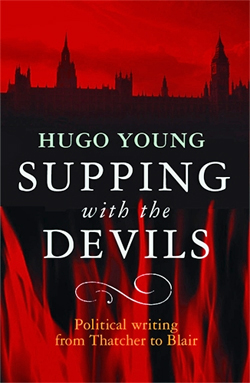
Supping with the Devils is the first collection of Hugo Young’s journalism. In it, he interprets the major events that have punctuated British political life, but it also considers subjects as diverse as the nature and future of the British state; the crisis of religious belief; and Britain’s place in the world. Urgent, penetrating and always original, these articles – taken from The Guardian, New Yorker and London Review of Books, among others – constitute a brilliant chronicle of a transformative period in British history.
Posted on October 19, 2003 by The Orwell Prize -

For the last fifty years, the German Occupation of France has been regarded as a period characterised by four things: cold, hunger, the absence of freedom and above all fear; a time when the indigenous population was cruelly and consistently oppressed by the army of occupation. The people of France were either bold members of the Resistance or craven collaborators. In this riveting and provocative study, Robert Gildea reveals a rather different story, a story which shows that the truth lies – as so often – somewhere in between. The winner of the Wolfson History Prize 2002.

















